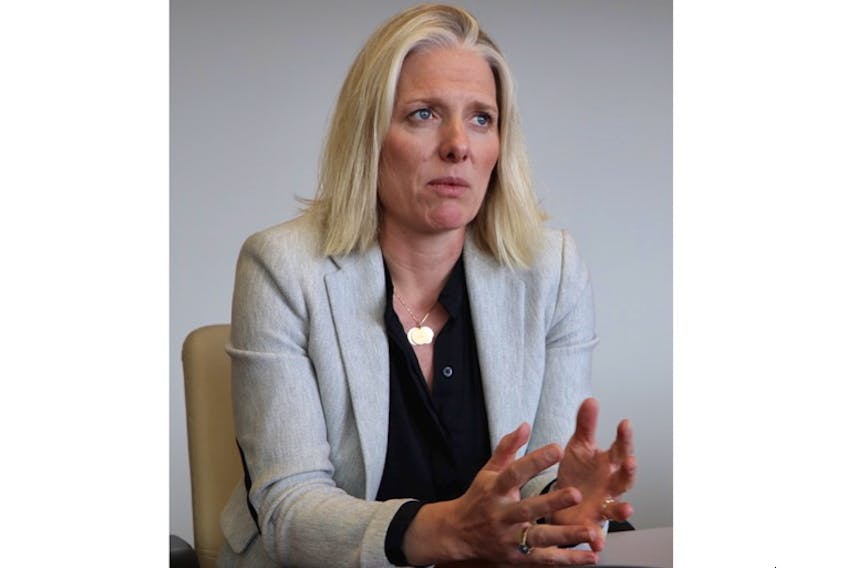OTTAWA , Ont.— Environment Minister Catherine McKenna rejected the majority of industry-inspired amendments proposed for Ottawa’s sweeping energy reforms, likely putting a final stamp on the controversial Bill C-69 and ending a months-long Senate pushback against the legislation.
Late on Tuesday, the environment ministry accepted just 62 out of well over 180 amendments that were put forward by Senators on C-69, a bill that proposes to overhaul the environmental review process for major projects including anything from sea ports to oil pipelines. A more lightly amended version of the legislation will be tabled in the House of Commons later this week, then sent back to the Senate for a final vote.
The decision to reject a majority of amendments could spark an uproar in some oil-rich Western provinces, where the bill became a sort of rallying cry against what many view as Prime Minister Justin Trudeau’s overzealous environmental policies. Legal and regulatory delays on major pipeline projects in recent years, including on the Trans Mountain expansion, have sown deep frustrations in Alberta and Saskatchewan, restricting market access and depressing Canadian crude oil prices.
In its response, the Liberals rejected around 90 per cent of amendments put forward by industry, rejecting some proposals outright while amending a number of others. The main changes include scrapping proposed language that said regulators “may,” rather than “must”, account for certain environmental and Indigenous rights considerations when reviewing a project.
The move by Ottawa is likely to spur an outcry from some industry groups and provincial premiers. Alberta Premier Jason Kenney has threatened a constitutional challenge against Ottawa if it enforces Bill C-69 without major amendments — or if the federal government pushes ahead with its contentions Bill C-48, a moratorium on oil tankers in northern B.C. waters.
On Monday, six premiers including Kenney sent a letter to Trudeau urging him to accept the amended version of Bill C-69, saying the legislation as written by the House would create “insurmountable roadblocks” to proposed projects. They warned that the bill could cause a retrenchment in oilsands capital spending plans and also dampen foreign investment levels, causing economic damage that would “echo from one coast to the other.”
Trudeau on Tuesday accused the six premiers — representing Alberta, Saskatchewan, Manitoba, Ontario, New Brunswick and the Northwest Territories — of purposely sowing
“I think it’s absolutely irresponsible for Conservative premiers to be threatening our national unity if they don’t get their way,” Trudeau said.
He then called on his main rival in the upcoming election to condemn the premiers’ calls.
“And anyone who wants to be prime minister, like Andrew Scheer, needs to condemn those attacks on national unity.”
The House review of Bill C-69 comes after a drawn-out opposition to the bill in the upper chamber. Senators on the energy committee reviewing C-69 promised a thorough review of the bill, and travelled cross-Canada to hear from witnesses. After months of study they put forward nearly 200 amendments to the legislation, the most in decades.
About half of the amendments were proposed by two oil and gas lobby groups, who aimed to restrict the influence of the environment minister in approving or rejecting projects, tightening timelines for project reviews, and removing some climate change-related considerations from the process, among other things.
Premiers in Alberta, Saskatchewan and other provinces also put forward nearly identical amendments.
Bill C-69 replaces regulations that were introduced by the Harper government in 2012 through an omnibus budget bill, which have been widely criticized for creating distrust in the Canadian regulatory regime.
The updated bill has been broadly supported by a number of industry groups, including the Mining Association of Canada, as well as environmental organizations. But the oil and gas community has argued that the legislation effectively expands avenues for environmental advocacy groups to oppose projects, while also providing too much political discretion to the environment minster in project decisions, among other issues.
Oil and gas lobby groups have also been strongly opposed to the C-48, the oil tanker moratorium. Conservative senators and some Independents have said the bill would unfairly target specific oil pipeline proposals planned to ship oil from communities in northern B.C. communities. A number of First Nations in northern B.C. and Alberta who support natural resource extraction have also opposed the bill.
• Email: [email protected] | Twitter: jesse_snyder
Copyright Postmedia Network Inc., 2019









